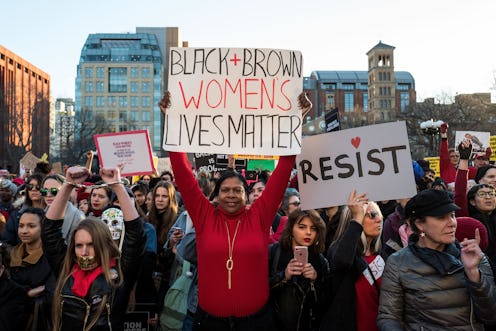Life

To quote noted philosopher Hannah Montana, nobody’s perfect. Such is human existence. When it comes to allyship, the same remains true: no one expects perfection. So, as imperfect humans growing every day, it’s important for each of us to acknowledge how to be a better ally. As in any aspect of life, when it comes to being an ally, there is always room for growth — and actively pursuing growth is what will strengthen the many movements out there for change.
Allies are an essential part of any movement. As a whole, society is likely going to be more receptive to the voices of allies — which is a frustrating truth and one that persists for the very reasons people are oppressed in the first place. For example, when a man calls out sexism, it’s often easier on society’s ears and praised in ways that would not hold true were a woman to do the same. Essentially, an ally has the privilege of saying, “Hey, look fellow members of the majority. I’m on your side, and here’s why I think what this minority group is saying is valid.” This is why allies are crucial when we talk about human rights.
Love alone does not trump hate. It takes work from everyone on every side. Here are 10 things you can do to make sure you’re being the best ally you can be.
1
Listen First
Step number one to being a good ally is simply to listen to the people who you are trying to support. Follow activists on Twitter. Read work by people who are part of marginalized communities. Talk to the people in your life who are directly affected by the cause you are working to support. These conversations are already happening. Before you add your voice as an ally, make sure you’ve heard what the people who are part of those communities have to say.
2
Speak Up, Not Over
Witnessing discrimination sucks. You know what arguably sucks more? Being the target of aforementioned discrimination. As an ally, it’s important to make sure you aren’t putting words into the mouths of the people you’re working to support. After listening, allies need to then use their voices to champion minority voices. The stories and struggles of underrepresented voices need to be told. Amplifying voices within marginalized communities is crucial because it lets those marginalized communities tell their own stories.
3
Do A Little Self-Reflection
We are all have learned biases. Even the most feminist of feminists likely has internalized misogyny to some degree. By deconstructing your own learned biases and recognizing why you think the things you think, you can work to recognizes those biases that persist culturally.
4
Get OK With Getting Uncomfortable
Talking about discrimination and injustice should make you uncomfortable. No decent human person is like, “I’m v. cool with the current stats on hate crimes!” It’s also important to make sure you aren’t using coded language to make yourself comfortable, but are in turn hurting the very group you want to support.
For example, you can’t really claim to be an ally to people of color while insisting that we live in a “post-race society.” Taking the “color blind” approach to race can be counterproductive, ignoring the racism that exists instead of addressing it. Saying things like “we live in a post-race society” erases the experiences of people who currently experience racial discrimination. Being able to “look past” race is a privilege. By allying yourself with a group, you should be fully acknowledging that the problems that group experiences exist instead of “looking past” them.
5
Don’t Tolerate Hate Regardless of Who Is or Isn’t In The Room
The R-word isn’t more or less okay depending on whether or not a person with disabilities is within earshot. Slurs don’t get to be situational. As an ally, it’s your responsibility to acknowledge hate when you hear or see it.
6
Ask Questions and Be Open to an Answer...
If you want to make sure you’re doing something right as ally, you can ask. However, you need to make sure you’re seeking truth, not comfort. Recognize when you’re seeking justification for a way you think or act instead of looking to do what is just.
7
...But Remember That You Are Not Entitled To A “Teachable Moment”
Maybe you ask a question you see as harmless, as an ally, but the person you ask gets offended. Consider the fact that you are likely not the first person to ask that same question.
I’ll be honest, as someone who frequently gets asked things like, “Where are you from?”: Sometimes it doesn’t bother me when some asks about my ethnicity. A lot of the times, though, it does. There are a lot of contributing factors to whether or not I want to answer that question at any given time, but the fact remains: I don’t owe anyone an explanation.
Respecting what a person is or is not comfortable discussing is key.
8
Acknowledge That You’ve Likely Messed Up and Probably Will Mess Up In The Future
It’s going to happen. We are all learning and growing every day. A good lesson in allyship and life in general: “Sorry but…” is not an apology. Don’t focus on why what you did or said wasn’t “actually homophobic” or “supposed to be sexist.” Impact always usurps intention. Apologize, learn, and be better next time.
9
Remember That Ally is A Verb
10
Repeat
Allyship doesn’t have an end date. There are certainly milestones in any movement but things like sexism, racism, and ableism are deeply embedded in our culture. Having a black president doesn’t end all racism. Legalized same-sex marriage doesn’t cure our culture of homophobia.
The fight for equal rights for all is still very much a fight. Stay active. Stay engaged. We will make it through, but to get there we need to work together.